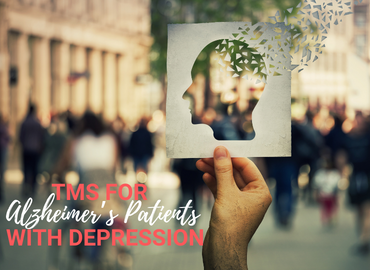TMS for Alzheimer’s Patients with Depression
The Need for Research
The Alzheimer’s Foundation of America defines dementia as, “A general term that describes a group of symptoms such as loss of memory, judgment, language, complex motor skills, and other intellectual functions caused by the permanent damage or death of the brain’s nerve cells, or neurons.” They go on to estimate that in 2010, there were about 35.6 million people in the world living with dementia. No one knows how many caregivers and loved ones are affected by their friend’s dementia, but we have no doubt that the number is troublingly high.
Alzheimer’s is not a catch-all term for dementia, but it is estimated that 50% – 75% of dementia cases are directly linked to Alzheimer’s disease, which we will call AD. AD is a chilling condition that steals people’s memories, loves, friendships, lifelong hobbies, and stories. Not only that, it degenerates other cognitive functions like language, impulse control, and decision-making.
Exploring Possibilities for Treating Alzheimer’s
We want to stay aware of advances in treating dementia and AD, particularly when it involves our specialty, transcranial magnetic stimulation (TMS). Anything we can do to make our fellow humans’ lives easier is worth pursuing.
Briefly, TMS is a noninvasive brain stimulation (NIBS) technique approved in the United States to treat diagnosed major depressive disorder, MDD. Many studies are underway, in the United States and around the world, to investigate TMS’s influence on conditions like AD, Parkinson’s disease, and schizophrenia. Some type of depression is frequently comorbid with these issues.
NIBS methods like TMS show encouraging results in improving cognitive function across a range of neurodegenerative conditions. These treatments administer electromagnetic pulses to the brain, primarily the frontal areas. These are packed with cells that have heavy influence on mood, impulse control, executive function, and sensory processing.
The European Community has deemed TMS useful for treating Alzheimer’s disease and has adopted it into procedure. Research is being performed with the goal of making TMS for AD available in the United States, but the wheels of medicine turn slowly. They must— high standards must be met before a medication, device, or treatment can be approved for use on the disorder in question.
Clearer, Longer
For any questions about our services, contact us here or call (585) 442-6960. We offer in-person services and telepsychology to keep our patients safe and make help more accessible.




